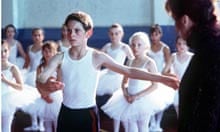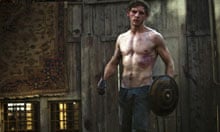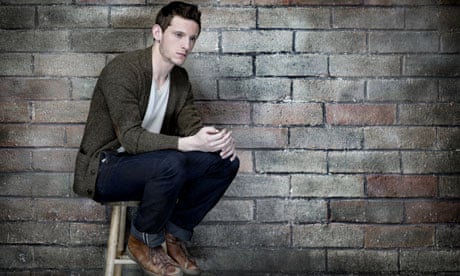In a low-lit rum bar in a fashionably shabby corner of West Hollywood, Jamie Bell recalls the first time he saw a film in a cinema. "It was Jurassic Park," he says. "I was eight years old and I was terrified because, you know – dinosaurs! They're real!" He tells a good story. Plenty of animation. And the louder he gets the more Geordie his accent. "At the end, the credits said: 'Directed by Steven Spielberg' and I thought: 'OK, I'm going to remember that name. Because he's done something to me here, something important.'"
Sixteen years later, it's happening again. In July, Bell plays the title role in Spielberg's latest, The Adventures of Tintin: The Secret of The Unicorn. It's one of four movies that Bell has coming out in 2011, a bumper year for the 24-year-old actor. First up is The Eagle, a swords-and-sandals adventure adapted from Rosemary Sutcliff's classic historical novel. And then comes Tintin, one of the most popular comic strips of the century, realised with innovative motion-capture technology by the world's most famous director. "If you told that kid watching those dinosaurs: 'You're going to be working with that man…'" He shakes his head. "It's just incredible. A massive milestone. It has monumental connections."
He's told this story before, and he'll tell it again. But it's a fitting story for Bell. It has a fairy-tale aspect, and Bell's career has always had a scripted quality to it – a working-class boy from the northeast of England is transported by the movies all the way from his local Odeon to the high tables of Hollywood. And the way it has been written, art and life have done a playful dance throughout, each informing and reflecting the other in uncanny and profound ways.
What could be more fairy tale than Billy Elliot – a fatherless ballet-dancing boy from Billingham plays a motherless ballet-dancing boy from somewhere just like Billingham and wins a Bafta into the bargain? Director Stephen Daldry selected him from 2,000 boys to play the title role, and it changed his life forever. He was 14, just entering puberty. Some child stars might prefer to consign their earliest roles to history as they grow up, but not Bell – he doesn't mind talking about Billy Elliot. He recognises how special it was.
"It is very impactful, it means everything, and everything kind of comes back to that," he says. "That wasn't really acting to me. That was my life. I'd put ballet shoes down my pants to hide them from my friends. I'd done all this before. So the Bafta doesn't feel like an achievement. The achievement was getting the role. But I consider that to be extremely lucky."
Luck is a loaded term. Particularly since what followed was a steady ascent – a coming-of-age story in which Bell grew from a boy actor into a man by playing a series of boys who become men. And the odd parallels continue. Orphanhood, for instance.
"My characters are often without a significant parental figure," he says. Bell himself has never met his father, who left while Jamie was in the womb. "I don't miss him," he says. "How could I? You don't miss what you never had." He's never tried to contact him; what he knows of him he learned from his mother, and this seems to suffice. When Billy Elliot came out his father told the press he wasn't going to force a relationship, which Bell says he appreciated. And that was a decade ago.
"The older I get, the less I feel the need to know him," says Bell. "Maybe that will change when I turn 35, I don't know."
And yet almost all of his roles have this common thread of a missing parent. Billy Elliot didn't have a mother. Neither did his character in Undertow, a boy from the deep south, on the run from a murderous uncle who turns out to be his father. In Hallam Foe, he played a boy so twisted with grief for his dead mother he wants to sleep with her lookalike. And in his latest film, The Eagle, Bell plays a slave boy, Esca, captive to a Roman commander. Slight and spry, Bell is a surprising choice, perhaps, for a sword-clanging drama – a far cry from Sparta – but Esca's fire comes from the fact that his parents had been slaughtered by Romans.
"Even Tintin doesn't have any parents to speak of," Bell says. "There's no mention of them. It's weird. Did I mention I also have a little white dog?"

Key to any coming-of-age story is the bit where the boy leaves home. And Bell has done plenty of that. So much so that home is an elastic concept now. "I don't know where home is. Of course my childhood home is always going to be that street, that school. But my creation of a home, which is what you start doing as a young adult, I haven't done that yet."
He was a nomad through his teens. Suitcase boy. Plucked from his home and sent off around the world making movies in one exotic location after the other. King Kong took him to New Zealand. Jumper sent him to Italy, Mexico and Egypt. He loved it. It was romantic and spy-like, jetting off to pretend to be someone else according to a brief (the script). But the adventure wore thin. "It got frustrating, because eventually you want to lay some roots and feel like: this is my place, this represents me." On the child-star fast track, this sense of wanting to settle arrived early. He was 20.
The first place he tried was New York in 2008. He told the Scotsman at the time that "LA is just not who I am. New York is full of crazy people, and I like that." But that only lasted a year. "Eventually the city sort of kicked me out," he now says. "It just gets to you – it's too hot, it's too smelly, it's too crowded, it's too… everything."
So he moved to Los Angeles, the pragmatic choice. "It wasn't new. I'd been coming here since I was a tiny person." And he's lived here for three years now. "It's basically an industry town, which I'm comfortable with. Billingham has steel and paint; LA has entertainment."
He insists his life in the Beechwood Canyon area, not far from the Hollywood sign, is "boring". When he's not making Spielberg movies, or flying to Budapest for The Eagle or to Derby for Jane Eyre – in which he'll play St John Rivers alongside Mia Wasikowska and Michael Fassbender – he likes to "get out and do the coastline". In a car, though, rather than on a board. "Surfing isn't really in my blood. It's hard to catch a big wave in Billingham." The rest of the time he spends at home playing Fifa 11 or walking his dog Cal Bones – "Bones because he's white, and Cal because of the Jimmy Dean character in East of Eden".
He's not the type to frequent Cuban bars like this one. It's not that he couldn't – he's not so famous that he can't leave the house. He's unknown to TMZ, free to be a normal citizen. He dated the actress Evan Rachel Wood for a while, but that hardly qualifies as gossip. Bell operates in a different orbit. And even if he did go to a bar like this, he wouldn't tell you who he went with. "That's my personal domain," he says emphatically. "I'm not going to name-drop. It's going to sound wanky."
But LA is perfect for Bell – a city of the loosely tethered. And Bell has always been this way. Even his support of Arsenal, which might suggest some kind yearning for a place or a heritage, arose out of nothing of the sort. All Bell wanted was to be accepted at school.
"I had no idea about football when I was dancing. So I asked this kid if I could borrow his Premier League sticker albums, and I learned every page, every player. I couldn't watch the games because we didn't have Sky, so that book was like the Bible. And then I had to pick a team. So I thought the easiest way was to just wear a jersey, and that's who you support, no questions asked. So my mum picked me one of those old Arsenal away shirts, really hideous yellow. But she liked it. She could have picked a red one and I'd be a Man United fan."
It didn't occur to him to choose his own jersey. Or to support Billingham or Middlesbrough. If there was ever an obvious path to follow, Bell avoided it, either by design or accident. But now he's a proper fan. A loyal Gunner. He speaks of sport as "the great unscripted drama, the theatre of dreams". If he wasn't an actor, he says, he would have been a sports journalist. "The stories in sports are just incredible! You couldn't make it up!"
Bell seems so well-adjusted it's unsettling. At press conferences he's a commanding presence. Rather than mumble or shrug, he holds forth about "Steven's vision" and his prowess as a "visual communicator" and "pioneer of new technology". If the press are foreign, he pronounces it "Tantan", the French way, and he has the politician's gift of pirouetting past any traps and hollows, remaining on-message and enthused.

No doubt his team can take a bow. He has the same manager and agent he had in the Billy Elliot days. Stephen Daldry was a mentor in his early years – he remains a close friend – and Bell has spent the rest of his transition into adulthood under the tutelage of one marquee male director after another: Peter Jackson, David Mackenzie, Clint Eastwood, Doug Liman, Kevin McDonald and now Steven Spielberg. "I'm one of those people who sits quietly and doesn't say much, but I'll take away a lot of stuff very quickly," he says. "I can't think of anything specific, really, except what Russell Crowe said: 'Don't fuck your publicist.' So I took that to heart and follow it closely."
Bell has also avoided the traditional pitfalls of child stardom. "I don't make huge movies," he says. "So I can go to the shops and hang out and it's fine." And Tintin, he says, won't change that. He's not the face of the film, after all – it's an animation. "Besides, no one knows about Tintin in America. He's not Spiderman. If you ask a kid here about Tintin, he'll be like: 'You mean Rin Tin Tin? The dog?'"
Given the stature of the people Bell has worked with, the absence of scandal and the orderly march of his career, his own arc appears to be frictionless, a rainbow. His films have been well received, with the possible exception of Jumper. And his auditioning days are over: the way he got Tintin, for instance, sounds especially charmed. Daldry was originally in line to direct it as a live-action film and Peter Jackson, the film's producer, called him when he was on the set of Hallam Foe. "He said he wanted me to fly down to New Zealand and work on Tintin. He put it to me like a work session."
The mere suggestion, however, that life has been easy makes Bell bristle. "It's not just like you walk into a room and someone gives you a job," he says. "It's a fight. Everything is a battle. The dancing was hard – all that practice, the constant competitions. And after Billy Elliot, I was suddenly this actor, but I didn't have a clue. What is acting? No one sits you down and says: 'This is how you should do it.' So to keep working for 10 years in the industry and manage to scrape along… Things don't come easy.
"There's a reason I play troubled characters," he adds. "But it's hidden, and I like it that way."
The coming-of-age story will be complete when Bell transcends from playing boys into playing men. It's a tricky transition and he's in no rush. He knows he looks boyish, and he embraces it. "I think playing young people is kind of great, in a way – you get to extend your childhood!" he says. "I don't think I could portray a high schooler, but I think young people are very interesting. The energy they have is unmatched and their emotions are intense."
Bell is not short of energy himself. The way he describes Tintin – "incredibly driven and morally correct" – applies well enough to him. At 24, he's starred in 16 movies to date and still chastises himself for being lazy. "I'm a terrible procrastinator," he says. "I should be more motivated to do things." And yet he does a lot. Lately he has been writing scenes and short films in his spare time, some of which he has shot. "I'm not disciplined in any kind of technique," he says. "I'm just exercising a muscle I'd like to have."
If he wasn't doing interviews, that's what he'd be doing today. He describes it all as "play" rather than work – especially acting. "I've never done a day's work in my life," he says. But then, Bell clearly takes "play" seriously. The prospect of four movies coming out this year "feels terrifying, mostly". And not because of the impending reviews – he welcomes all that. It's the films themselves that make him squirm. He can't bear watching himself.
"I'm never happy with it. I've never thought: 'Oh yeah, I nailed that,'" he laughs. "Not once."
It's time to go. He's off to New Zealand for more Tintin action in a few days, and there are a million things to do before then. More interviews, more writing, more editing. It seems inevitable that Bell will direct one day. He'd like to work with some of his peers, people such as Andrew Garfield, Emile Hirsch and Paul Dano, whose work he describes as "sublime". With a spring in his step, he walks out into the sunshine. He's just getting started.
The Eagle is released in cinemas on 23 March
Sanjiv Bhattacharya is a writer and Observer journalist based in America
